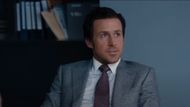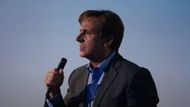The Big Short was one of the most discussed films of 2015 and it cemented filmmaker Adam McKay as a fascinating voice to look out for. It's not like McKay hadn't made great films before, but they were mostly out-and-out comedies like Anchorman, Step Brothers, or The Other Guys. Unlike these films, The Big Short allowed him to sink his teeth deep into an issue that shook the global economy in the 2000s.
Based on Michael Lewis' 2010 novel, The Big Short: Inside the Doomsday Machine, McKay's film follows the 2007 housing market collapse. It stars an ensemble of stars like Steve Carell, Christian Bale, Ryan Gosling, and Brad Pitt, who played regular people in regular jobs connected to the financial crisis. There is so much to unpack about the tragedy, which must have put a lot of burden on the writing team. The cast was aware of the severity of this incident and treated it as such.
During the promotional tour, the cast admitted that the film handled the complexity with an uncommon ease.
"It's such a great book, but it's such a complicated subject matter," Steve Carell said during an interview with ABC News.
The Big Short uses hilarious cameos to make us understand complicated financial matters

Steve Carell's words about The Big Short hold true since it is not easy to translate these intricacies on the big screen, especially considering all the jargon involved. However, Adam McKay used hilarious cameos from the likes of Margot Robbie, Anthony Bourdain, and Selena Gomez, who turned all these seemingly inaccessible discussions into digestible bites of information. As it turns out, this was the writer-director's intent since he wanted everyone to understand what went on.
During a conversation with Fox, Ryan Gosling spoke about this unique directorial approach:
"The film takes the position that this world is intentionally made to be alienating, to make you feel stupid. The terminology is designed to make you feel dumb so that you feel like you can't understand it. And therefore, you won't ask any questions and they'll just be able to do whatever they want. If you approach it from that perspective, it opens things up and allows you to think that 'Maybe I can understand it'"
The Big Short: Steve Carell, Christian Bale, and Ryan Gosling talk about their characters

The Big Short starred Steve Carell as Mark Baum, a trading firm's leader, based on Steve Eisman, a real-life person who profited from the economy's downfall. Eisman was reportedly anxious about how he would be portrayed in the film. However, Baum isn't shown as a man you would naturally despise. Rather, he is a family man who understands the gravity of the situation. When asked about how he made Baum rather sympathetic, Carell told HeyUGuys:
"I tend not to approach a character with the idea of how the audience will relate to that character. I based it on the person that I met, and I found him to be someone I cared about and admired. So, I wasn't trying to create a person that could be relatable. I was just trying to reflect on the person that I met."
Unlike Carell, Christian Bale plays a character who shares the name with its real-life inspiration. Bale plays Michael Burry, known as one of the first people to realize that there is such a housing market bubble. Speaking about his acting process and the research, Bale told Fox:
"Mike got incredibly ill during this period, not only because of the stress of the financial fraud that was going on but because of the personal response from his clients who ended up earning them a fortune but they got angry with him."
To explain the details, The Big Short showed its characters breaking the fourth wall. In an interview, Ryan Gosling spoke about how it impacted his acting process:
"It was really tricky because I am playing someone that's loosely based on a real person. That's taking a huge liberty with them to then, suddenly break the fourth wall and be like a talk show host and introduce the celebrity cameos."
Thanks to their collaborative effort, The Big Short was nominated for five Oscars and won one, for the film's screenplay. Adam McKay earned this Oscar with Charles Randolph, and later went on to work on similarly comedic satires, including Succession, where he served as an executive producer.
Love movies? Try our Box Office Game and Movie Grid Game to test your film knowledge and have some fun!
